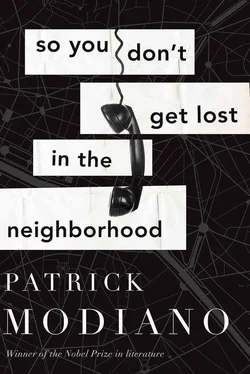The glazed door opened slowly and he found himself in a white entrance hall lit by a wall lamp. He did not take the lift and went up by the right-angled staircase. When he reached the landing, she was standing at the half-open door, her face partly hidden. Then she drew back the door and stared at him as though she had difficulty recognising him.
“Come in, Jean dear. .”
A timid, but slightly husky voice, just as it had been fifteen years ago. The face had not altered either, nor had the expression. Her hair was not as short. It reached down to her shoulders. How old was she now? Thirty-six? In the hallway, she was still looking at him with curiosity. He tried to think of something to say to her:
“I didn’t know whether I should press the button that said ‘Vincent’. .”
“My name is Vincent now. . I’ve even changed my first name, would you believe. . Agnès Vincent. .”
She showed him into the adjoining room, which was probably used as a drawing room, although the only furniture consisted of a sofa and, next to it, a floor lamp. A large bay window through which he could see trees that had not lost their leaves. It was still light. Glimmers of sunshine on the wooden floor and on the walls.
“Sit down, Jean dear. .”
She sat down at the other end of the sofa, as if to observe him better.
“Do you remember Roger Vincent, perhaps?”
Scarcely had she uttered this name than he did in fact remember an American car, a convertible, parked outside the house at Saint-Leu-la-Forêt, and in the driver’s seat sat a man, whom he had assumed, at first, was also American on account of his height and a slight accent when he spoke.
“I got married a few years ago to Roger Vincent. .”
She looked at him and she had an embarrassed smile on her face. So that he should forgive her for this marriage?
“He’s in Paris less and less. . I think he’d be glad to see you again. . I phoned him the other day and I told him that you had written a book. .”
One afternoon, at Saint-Leu-la-Forêt, Roger Vincent had come to collect him outside school in his convertible American car. It glided so quietly along rue de l’Ermitage that you could not hear the sound of the engine.
“I haven’t read your book to the end yet. . I stumbled on the passage about the Photomaton shop straight away. . I never read novels, you know. .”
She seemed to be apologising, as she had done just now when she had informed him about her marriage to Roger Vincent. But no, there was no point in her reading the book “to the end” now that they were sitting on the sofa together.
“You must have wondered how I was able to get your address. . I met someone who drove you home last year. .” She frowned and seemed to be searching for a name. But Daragane himself came up with:
“Guy Torstel?”
“Yes. . Guy Torstel. .”
Why do people whose existence you are unaware of, whom you meet once and will never see again, come to play, behind the scenes, an important role in your life? Thanks to this individual, he had found Annie again. He would have liked to thank this Torstel.
“I’d completely forgotten this man. . He must live in the neighbourhood. . He accosted me in the street. . He told me that he had come to the house at Saint-Leu-la-Forêt fifteen years ago. .”
It was probably this meeting with Torstel at the racecourse last autumn that had jogged his memory of her. Torstel had talked about the house at Saint-Leu-la-Forêt. When Torstel had said: “I can’t remember what this place on the outskirts of Paris was”, and also: “The child, it was you, I imagine”, he, Daragane, had not wished to answer. He had not thought about Annie Astrand, or about Saint-Leu-la-Forêt for a long time. However, this encounter had suddenly revived memories that, without his being fully aware of them, he was careful not to awaken. And now, he had done so. They were very tenacious, these memories. That very evening he began to write his book.
“He told me that he had met you at a racecourse. .”
She smiled as though it were a joke.
“I hope you’re not a gambler.”
“No, not at all.”
He, a gambler? He had never understood why all these people in casinos spent so long standing around tables, silent and motionless, looking as though they were more dead than alive. And every time Paul had talked to him about doubling up on his losses, he found it difficult to maintain his concentration.
“With gamblers, things always end up very badly, Jean dear.”
Perhaps she knew a great deal about the subject. She frequently used to return very late to the house at Saint-Leu-la-Forêt, and he, Daragane, had sometimes found he could not get to sleep until she returned. What a comfort to hear the sound of her car’s tyres on the gravel and the engine which you knew was about to be switched off. And her footsteps along the corridor. . What did she do in Paris until two in the morning? Perhaps she gambled. After all these years, and now that he was no longer a child, he would have liked to put the question to her.
“I didn’t really understand what this Monsieur Torstel does. . I believe he’s an antique dealer at the Palais-Royal. .”
It was clear she did not know what to say to him. He would have liked to make her feel at ease. She probably felt as he did, as though there were a shadowy presence between them, which neither of them was able to speak about.
“So, you’re a writer now?”
She was smiling at him, and this smile struck him as ironical. A writer. Why not confess to her that he had written Le Noir de l’été in the style of a missing person advertisement? With a bit of luck, the book would attract her attention, and she would get in touch with him. That is what he had thought. Nothing more.
The daylight was fading, but she did not switch on the standard lamp beside her.
“I should have got in touch with you before now, but I had rather a turbulent life. .”
She had just used the perfect tense, as though her life were over.
“It didn’t surprise me that you should have become a writer. When you were little, at Saint-Leu-la-Forêt, you read a lot. .”
Daragane would have preferred her to talk about her own life, but she seemed not to want to do so. She was sitting on the sofa, in profile. An image that had retained great clarity, in spite of all these lost years, came back to him. One afternoon, Annie, in the same position, head and shoulders to the right, in profile, seated at the wheel of her car and he, a child, beside her. The car was parked outside the gate of the house, at Saint-Leu-la-Forêt. He had noticed a tear, barely visible, slipping down her right cheek. She had made a sudden movement with her elbow to wipe it away. Then she started up the engine, as though nothing were the matter.
“Last year,” said Daragane, “I met someone else who knew you. . in the Saint-Leu-la Forêt days. .”
She turned towards him and cast him an anxious look.
“Who?”
“A Jacques Perrin de Lara.”
“No, I can’t think who. . I met so many people in the Saint-Leu-la-Forêt days. .”
“And Bob Bugnand, does that mean anything to you?”
“No, nothing at all.”
She had drawn closer to him and was stroking his forehead. “What’s going on inside that head of yours, Jean dear? Do you want to cross-question me?”
She looked him full in the eyes. No threat in this gaze. Just a slight anxiety. She stroked his forehead again.
“You know. . I’ve got a bad memory. .”
He recalled Perrin de Lara’s words: “The only thing I can tell you is that she had been in prison.” If he were to repeat this to her, she would show huge surprise. She would shrug and she would reply to him, “He must be confusing me with someone else”, or else, “And you believed him, Jean dear?” And perhaps she would be genuine. In the end, we forget the details of our lives that embarrass us or are too painful. We just lie back and allow ourselves to float along calmly over the deep waters, with our eyes closed. No, it is not always a matter of deliberate forgetfulness, a doctor whom he had engaged in conversation had explained to him, in the café below the blocks of flats in square du Graisivaudan. This man had also inscribed a little book to him that he had written for Presses universitaires de France, L’Oubli .
Читать дальше












